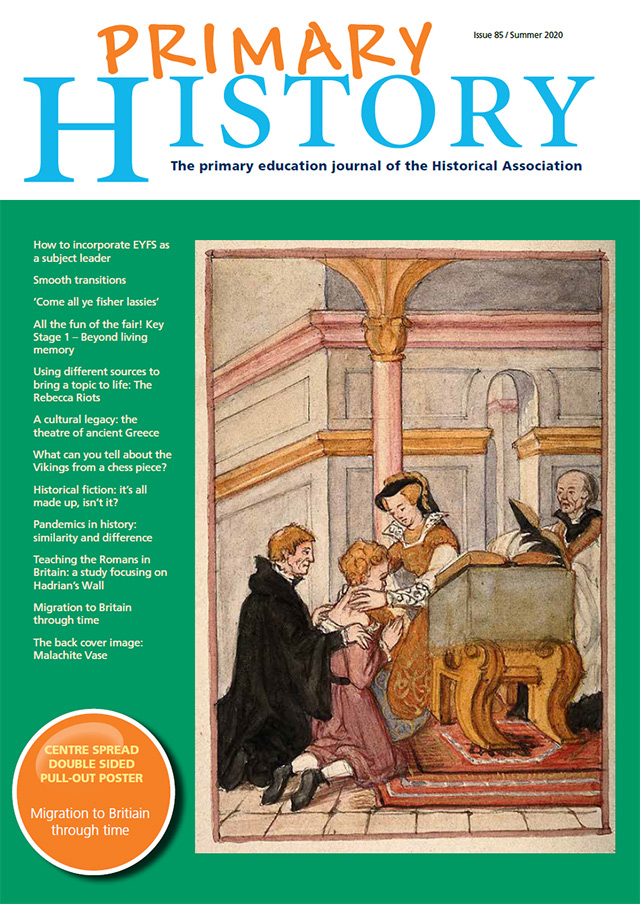Primary History 85: Out now

Editorial
The current coronavirus crisis gives us pause for thought about how people in the past have coped with major outbreaks of illness. We can look at similarities and differences between the current pandemic and events such as the Great Plague of 1665 and Spanish Flu in 1918. Whenever people have deep concerns about situations they often look to the past for insights and reassurances. Children will have many questions and anxieties about what is happening at the moment and teachers can help them to develop wider historical understanding that puts the current situation into some sort of context. Hippocrates is quoted as having said that ‘Healing is a matter of time, but it is sometimes also a matter of opportunity’. A quote such as this is a way of exploring questions about how long pandemics in the past have lasted and how scientific ingenuity and luck have played a part in moving medicine forward.
As teachers struggle for new ideas to keep pupils learning remotely, this edition can provide supporting strategies and some useful subject knowledge. Rob Nixon’s article on incorporating EYFS as a subject leader includes some great questions that children could be asking family members as they spend more time together at home or online. These questions can provide a focus for developing family history discussions. Karin Doull looks at events beyond living memory for Key Stage 1 teachers and pupils. Karin looks at the amazing story of the Scottish Herring Girls who became such an attraction as they journeyed up and down the east coast of Britain in the nineteenth century during the herring fishing season. Karin’s suggestions of activities and questions would support an engaging investigation for Key Stage 1 children.
Linda Cooper’s article on transitions describes how important it is for subject co-ordinators to develop motivating and engaging in-depth studies that challenge pupils. She uses the example of using census material to develop insights about life in the late Victorian period. Using Linda’s ideas, subject co-ordinators can set investigative work for pupils that has a strong disciplinary framework. If (a big if) subject co-ordinators have time, then they could be following Linda’s advice and reaching out to local secondary schools to ensure that the work set in Year 7 and 8 develops from the high-quality work she suggests in Year 6, rather than letting pupils’ learning plateau in these years.
Alf Wilkinson looks at the remarkable discovery of 93 chess pieces from 4 separate chess sets, found in 1831 on the Isle of Lewis in the Outer Hebrides. Alf looks at how these artefacts can be examined and what they might tell us about the people who made them and played with them. In a separate article Alf looks at the role of historical fiction and how teachers and pupils can engage with it. He argues that historical fiction has a legitimate place in the classroom in extending historical understanding and provides several examples to illustrate his points.
Some of the articles in this edition look at British history in a wider sense. Damienne Conway’s favourite place is Conway Castle in Wales. While visits in the short term are not possible, Damienne includes a list of online resources that can help with planning remote lessons. Clare Horrie from the National Archives looks at the Rebecca Riots which took place in Wales between 1839 and 1843. Clare provides some sample questions that can help teachers and pupils to engage with primary sources in order to develop their historical understanding. Sue Temple’s article examines Hadrian’s Wall and its symbolism as a frontier of what was regarded as the civilised Roman Empire. Sue looks at how teachers could engage pupils with the Wall from a range of approaches using high-quality questioning. Paul Bracey and Darius Jackson investigate migration from Ireland and place it in the wider context of migration across British history. They provide a range of thought-provoking activities to develop pupils’ subject knowledge and historical enquiry skills.
Matthew Sossick is Deputy Director and Head of Initial Teacher Education at the University of Roehampton and a long-time history educator.

